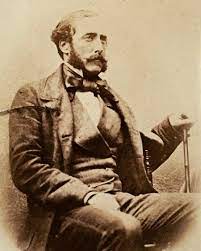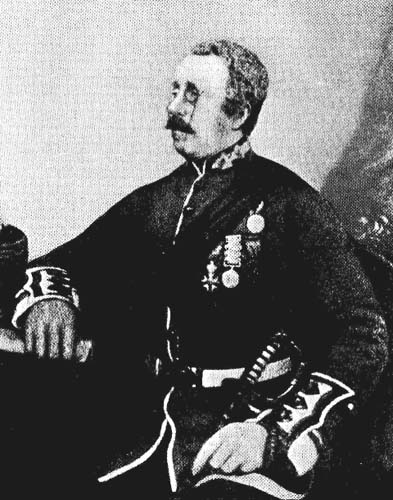The harrowing tale of a Kildare man’s fate forms the plot for Stephen Canavan’s new book. His name was Patrick McCaffery, but he achieved immortality in the song that is known as McCafferty
 Captain John Hanham (public domain)
Captain John Hanham (public domain)“A loaded rifle I did prepare, for to shoot my Captain on the Barracks Square…”
Ominous words from the folk ballad McCafferty.
Now, a new novel by Lancashire writer Stephen Canavan The Myth of Vengeance investigates the true and shocking story behind the controversial ballad that has his name erroneously given as McCafferty. The book, according to Canavan, proves that the story still has the power to surprise and intrigue, not only in Ireland and Britain, but all over the world as it has a universal theme.
Canavan is undoubtedly right, because this is a story that deals with visceral events emotions and controversial events.
Canavan, 49, a freelance journalist, whose family originally came from Avoca, Co. Wicklow, first heard the story as a small child from his grandparents and father - who used to sing the ballad for a dare, while on National Service in Britain.
“My grandma learnt it from her Irish father who picked it up in the British army serving in the Boer war.” Canavan said. “She sang it to me as a child and she would always preface her performance by saying: ‘This song will get me arrested.’ I discovered the actual words to the ballad years later – hidden away inside of my late father’s Victorian fob watch — which he left me when he died.
“When I read the words and I found out it was a true story that had taken place literally five minutes from where I live in Preston, I knew one day I would have to write about it. The Myth of Vengeance took around 10 years to research and write – it’s been a consuming vocation.
 Colonel Hugh Denis Crofton (public domain)
Colonel Hugh Denis Crofton (public domain)
PATRICK McCaffery was born in Athy, Co. Kildare, in 1842. His birth name was McCaffery, and that is the spelling he used. It is also the form of the name used in in official documents and the coroners inquest.
The ballad, however, is universally known as McCafferty, a misconstruction — perhaps because McCafferty is a more common name.
After journeying to England at an early age to work at in the cotton mills of Stalybridge and Mossley near Manchester,McCaffery enlisted in the 32nd Duke of Cornwall’s Regiment of Foot on Oct 10, 1860. He was 18.
The young Kildare man was immediately posted to Fulwood Barracks in Preston, Lancashire. A quiet, reclusive bookworm and loner, McCaffery wasn’t a natural soldier by any means natural, and seems to have provoked the enmity of the Barracks Adjutant Captain John Hanham.
Hanham was a battle-scarred veteran of the Sikh Wars in India. On Friday, September 13, 1861, Private McCaffery was on guard duty when Captain Hanham ordered him to chase after three children who were playing near the windows of the officers’ quarters. He was told first to take their names.
A few months earlier, the same windows had been broken, the repairs having to be paid by the officers themselves — an action Captain Hanham had no intention of being repeated.
According to Hanham, McCaffery reacted to this order insolently and slovenly, only taking one name, and was immediately placed on a charge, which would be read the following day.
The next morning, still simmering with resentment, McCaffery spotted his adjutant walking across the Barracks Square, and after kneeling and taking aim with his Enfield Rifle, fired once at the moving red-coated figure. In one moment of madness, this one bullet mortally wounded two British officers, not only Captain Hanham, but the Depot Commanding Officer and Co. Leitrim born Irishman, Colonel Hugh Denis Crofton.
Both men died in agony some hours later. The murders sent shockwaves not only through British Victorian society, but the military itself, leading to questions in parliament about the British army’s approach to military discipline.
Heated exchanges about the affair became a major part of the nation’s newspaper letter columns.
Patrick McCaffery was inevitably found guilty and sentenced to death at Liverpool Assizes in December of that year. He was publicly executed before some 40,000 people at Kirkdale County Gaol on January 11, 1862.
“Preston had a burgeoning Irish and entrenched Catholic community then, and there was a great deal of sympathy for the offender. To the disgust of authorities, the people of Lancashire flocked to support McCaffery at his hanging.” Canavan told The Irish Post.
“The working classes travelled to Liverpool on trains or by foot, standing in an unusually shocked silence in their thousands in the pouring rain before the scaffold as he was hanged. The ‘cotton famine’ was just about beginning to hit Preston and Lancashire, and McCaffery became – rightly or wrongly – a symbol of the people’s discontentment with those who held the whip hand over them.”
McCaffery’s mournful fate led to the creation of the folk ballad McCafferty allegedly deemed so subversive that it was said to be an offence to be caught singing it while on duty in the British army. Over the subsequent years, the ballad and the story took on a life of itself, often shrouded in myth and historical misrepresentation.
The ballad McCafferty was covered with varying degrees of historical accuracy by numerous Irish musicians such as The Dubliners and Dominic Behan. The latter thought the story utterly fictionalised and untrue. But true it was.
The song emerged as a street ballad in the latter part of the 19th century, and is set to the traditional Irish tune Cailín Óg a Stór, the same melody used for The Croppy Boy. It appears in Brendan Behan’s 1958 play The Hostage, being sung as a lament by two of the characters.
“It is a tragic and evocative story, that has travelled the whole world, and which The Myth of Vengeance proves still has the power to shock, horrify and move, more than 160 years later.” Canavan explained. “Indeed, McCaffery, or McCafferty, is still sung to this day in the folk clubs and pubs of Preston, and throughout the world. Meanwhile his ghost is said to still stalk the corridors of Fulwood Barracks to this day.”
The first and last verses are:
When I was eighteen years of age,
Into the army I did engage.
I left my home with good intent,
To join the forty-second Regiment.
So come all you officers take advice from me:
And go treat your men with some decency
For it’s only lies and tyranny
That have made a murderer of McCafferty!

